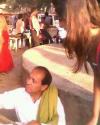Quotes by Vikram Seth
I simply seem to drift. But I sort of allow the drift, because it has a kind of check - it forces me to work harder at what I'm interested in.
The point really is that a writer tends to write a book that he or she tends to write. It's as simple as that. Of course, it's important to make a living and all that, but the main impulse as far as I'm concerned - and I'm sure as other writers are concerned - is to tell a story that I feel impelled by.
Those books of mine that are remunerative - I'm not talking about poetry here - take years to write, and I am never sure they'll be successful. So writing is a risk in more senses than one.
I tend to follow a scattershot approach to reading a lot of very diverse subjects interest me, and I'm quite happy to read stuff on any of them.
You can talk good ideas out of existence.
I know from an editor's point of view or a publisher's point of view it's easier to slot me into a particular niche. But I know that I'd be bored unless I wrote a book that in some senses was a challenge.
I am careful about fiction. A novel is not a tract or an essay. If I want to write about land reforms, or Hindu-Muslim relations, or position of women, I can do it as it affects my characters as in 'A Suitable Boy.' I could only write about issues specifically through essays. But I'll do that only if I have something worthwhile to say.
I think if something is worth doing, it's worth doing well. And worth thinking about it as well.
In general, questions are fine; you can always seize upon the parts of them that interest you and concentrate on answering those. And one has to remember when answering questions that asking questions isn't easy either, and for someone who's quite shy to stand up in an audience to speak takes some courage.
Poetry, I think, intensifies the reader's experience. If it's a humorous facet of the story, poetry makes it more exuberant. If it's a sad facet, poetry can make it more poignant.
I don't pick and choose subjects or settings; they pick and choose me.
I often feel newspapers are just filling up space. Of course, I also know people who write really long books.
I don't think people give Indian society enough credit. We may not like to talk much about things but we do, basically, want to live and let live.
Dear though the reader might be, I'd be silly to cater to what the reader wanted.
I am certainly not allergic to causes - particularly on subjects such as religious intolerance.
I rarely listen to music while writing. If I don't like it, it bothers me, and if I like it, it absorbs me so much I can't write.
If I'm compelled to do something, I don't shy away from it simply because I haven't tackled it before.
The thing about inspiration is that it takes your mind off everything else.
I love speculating about solutions to problems in mathematics. I have no interest whatever in sudoku. But I do look at chess and bridge problems in newspapers. I find that relaxing.
I don't read as much as people may expect. In fact, sometimes I feel that I should probably read more, but then I do believe that one of the big problems of our times is that there's too much reading and not enough thinking.
Why do writers, say, give up a job in economics and decide to write poetry? Or, why do they give up a job in a bank and decide to paint, like Krishan Khanna? They want to convey something.
In spite of all temptations of belonging to many nations, I've remained an Indian.
The trick to being a novelist is to act like an iceberg. Make it seem as if you're displaying only one-tenth of what you know, and the other nine-tenths isn't visible and never mind if that part is pure styrofoam!
Do not write if there is no tremendous urge to do so. At the heart, there must be an inspiration or muse or one of those old-fashioned things. Else, why bore yourself, destroy other people's interest and kill trees?
I need my natural laziness to be counteracted by obsession in order to do anything.






